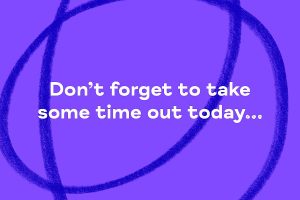Five Ways to Wellbeing for Young People: Take Notice
11/05/2020

Each week our schools’ mental health practitioners will look at one of the ‘Five ways to wellbeing’ (Connect, Be Active, Try Something New, Give and Take Notice). Having a good balance in these five areas of your life has been proven to increase people’s health and happiness. This week we will look at:
Take Notice
‘Take Notice’ is about paying attention (on purpose) to what is going on around you and how you feel, in the present moment.
It is sometimes hard to see how just ‘Taking Notice’ can help us feel happier and healthier. However, taking time to focus on the here and now within this busy, confusing and sometimes scary world we live in can help us:
- Enjoy life and appreciate what we have
- Understand ourselves better
- Stay calm
- Think about how to approach challenges
‘Take Notice’ is connected to mindfulness – a popular meditation practice that encourages people to notice and accept their current thoughts and feelings, whilst staying in the present moment (which means trying not to focus on the past or future). This one-minute video from Smiling Mind helps explain mindfulness.
Here are some mindful activities to try:
Ways to Take Notice:
In our busy daily lives, we rarely take time to stop, pay attention to what is going on right now, and appreciate the world around us. It may be difficult to know how to start taking notice, so here are three simple examples for you to try:
Senses
A good place to start is with our five senses: smell, sight, hearing, touch and taste.
Suggested activity: Take a seat somewhere comfortable. Then, spend a few minutes noticing:
- Five things you can see
- Four things you can touch
- Three things you can hear
- Two things you can smell
- One thing you can taste
This exercise is great for calming your mind if you are feeling distracted. You could also try this simple three minute mindfulness grounding meditation, which guides you through using your senses.
Music
We often have music on in the background, like the radio or a playlist, but do not really notice it. Giving your full attention to music you really enjoy, is a nice way to take notice.
Suggested activity: Put on some music that usually makes you feel happy. Spend some time listening to it without doing any other activity. Notice what happens in your body as you listen – are you smiling? Does your body feel relaxed? Or does it feel like moving to the music? (If it does, go for it!)
After listening for a while, consider these questions:
- Did it feel different to just focus on the music and nothing else?
- Did the music bring back any memories?
- How do you feel now, afterwards?
Do Something Different
People tend to like routine and things that are familiar. However, shaking things up and doing something differently than how we normally would, encourages us to take notice and appreciate our surroundings.
Suggested activity: What small, five-minute change could you make to today? Here are some suggestions if you are stuck for ideas:
- De-clutter your desk or bedroom floor
- Have something different for breakfast
- Listen to a piece of music you would not normally pick
- Look out your window and find three things you have never noticed before
‘Taking Notice’ to help cope with difficult feelings
Everyone has sad, worried, or angry thoughts sometimes; it is totally normal and part of being human. Taking notice can help us cope with these thoughts though, by helping us accept and let go of them. This short video from Headspace illustrates this idea.
These are some ways of taking notice for you to try if you are having a difficult day:
- Take a brain break – The author Matt Haig wrote that “panic is the product of overload”. Too much information or too many things happening at once, can stress us out. So, for example, if scrolling through the news or social media makes you feel anxious or overwhelmed, switch off your phone for an hour. Do something relaxing or creative instead – go for a walk, bake, read a book, do a jigsaw puzzle – whatever it is that will give your brain a well-needed rest.
- Focus on the positives – It is okay to feel sad or worried about things right now. However, when we worry a lot about the past or future, it is easy to forget all the good things, however small they may be, that are happening right now.
Suggested activity: Spend five minutes either writing or thinking of what made you G.L.A.D. today:
G: Something you were Grateful for
L: Something you Learned
A: One small Accomplishment you did
D: Something that brought you Delight
Try and recall what made you G.L.A.D. each day, and see how it makes you feel.
- Notice your breathing – When we feel anxious, stressed or angry, our breathing becomes fast and shallow. Noticing this, and trying to take slow, deep breaths instead, helps to calm down the body and mind, which makes us feel better.
A way of practicing this deep breathing is the ‘7 11’ technique:
Breathe in through your nose for 7 counts
Breathe out through your mouth for 11 counts
Then repeat
This video shows another deep breathing technique called ‘alternate nostril breathing’. You might feel silly trying this at first, but it really helps you to relax if you are worried or wound up.
More to do:
Once you know how, taking notice is a simple way of building happiness and calm into your day. Here are some final suggestions:
- Spend time in nature: Although this is hard for some of us to do at the moment, spending time in the park or your garden will help you relax and use your five senses to take notice of the world around you. Why not try this two-minute mindfulness ‘Sounds Meditation’ to guide you?
- Do what you love: Bring ‘take notice’ into activities you already enjoy. We mentioned music earlier, but how about taking notice of your body, thoughts and feelings whilst colouring, exercising or cooking and eating a nice meal?
- Download an app: If you have a smartphone, these are some good free apps to support you with taking notice and being mindful:
- Mindful meditations – Headspace, Breathe, or Smiling Mind
- Mindfully make music – Cove
- Mindful colouring – Zen Colouring or Mandala Colouring Pages
- Coping Calendar: Action for Happiness created a 30 day calendar of ideas on how to mindfully look after yourself
Download the leaflet version of this information
